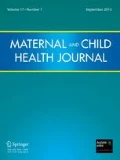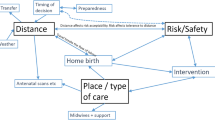Abstract
Objectives The objective of this study was to examine experiences with, and barriers to, accessing postnatal care services, in the context of a maternal health initiative. Methods As part of a larger evaluation of an initiative to promote facility deliveries in 8 rural districts in Uganda and Zambia, 48 focus groups were held with recently-delivered women with previous home and facility deliveries (6 per district). Data on postnatal care experiences were translated, coded and analyzed using thematic content analysis techniques. Results were categorized into: positive postnatal care experiences, barriers to postnatal care utilization, and negative postnatal care experiences. Results Women who accessed care largely reported positive experiences, with Zambian women generally reporting more positive interactions than Ugandan women. The main reasons given for low postnatal care utilization were low awareness about the need, fear of mistreatment by clinic staff, cost and distance. In half of the focus groups, women described personal experience or knowledge of denial or threatened denial of postnatal care due to the birth location. Although outright denial of care was not common, women frequently described various types of actual or presumed discrimination because of having a home birth. Conclusions for Practice While many women reported positive experiences with postnatal care utilization, cases of delay or denial of postnatal care exist. As programs incentivize facility deliveries, the lack of focus on postnatal support may place home-delivered newborns in “double jeopardy” due to poor quality intra-partum care and reduced access to postnatal care.
Similar content being viewed by others
Notes
Five Zambian Kwacha (ZMW) was approximately equal to USD 1 at the time of the study.
References
Abuya, T., Warren, C. E., Miller, N., Njuki, R., Ndwiga, C., Maranga, A., et al. (2015). Exploring the prevalence of disrespect and abuse during childbirth in Kenya. PLoS ONE, 10(4), e0123606. doi:10.1371/journal.pone.0123606.
Barros, A. J., Ronsmans, C., Axelson, H., Loaiza, E., Bertoldi, A. D., Franca, G. V., et al. (2012). Equity in maternal, newborn, and child health interventions in Countdown to 2015: A retrospective review of survey data from 54 countries. Lancet, 379(9822), 1225–1233. doi:10.1016/S0140-6736(12)60113-5.
Bhutta, Z. A., Das, J. K., Bahl, R., Lawn, J. E., Salam, R. A., Paul, V. K., et al. (2014). Can available interventions end preventable deaths in mothers, newborn babies, and stillbirths, and at what cost? Lancet, 384(9940), 347–370. doi:10.1016/S0140-6736(14)60792-3.
Blencowe, H., & Cousens, S. (2013). Addressing the challenge of neonatal mortality. Tropical Medicine and International Health, 18(3), 303–312. doi:10.1111/tmi.12048.
Bohren, M. A., Hunter, E. C., Munthe-Kaas, H. M., Souza, J. P., Vogel, J. P., & Gulmezoglu, A. M. (2014). Facilitators and barriers to facility-based delivery in low- and middle-income countries: A qualitative evidence synthesis. Reproductive Health, 11(1), 71. doi:10.1186/1742-4755-11-71.
Chimhutu, V., Lindkvist, I., & Lange, S. (2014). When incentives work too well: Locally implemented pay for performance (P4P) and adverse sanctions towards home birth in Tanzania—A qualitative study. BMC Health Services Research, 14, 23. doi:10.1186/1472-6963-14-23.
Creswell, J. (2012). Qualitative inquiry and research design: Choosing among five approaches (3rd ed.). London: Sage Publications.
France-Presse, A. (2015). Ugandan activists welcome ‘landmark’ ruling on maternal mortality. London: Daily Mail.
Freedman, L. P., & Kruk, M. E. (2014). Disrespect and abuse of women in childbirth: Challenging the global quality and accountability agendas. Lancet, 384(9948), e42–e44. doi:10.1016/S0140-6736(14)60859-X.
Greeson, D., Sacks, E., Masvawure, T. B., Austin-Evelyn, K., Kruk, M. E., Macwan’gi, M., et al. (2016). Local adaptations to a global health initiative: Penalties for home births in Zambia. Health Policy and Planning. doi:10.1093/heapol/czw060.
Irvine, R., McPhee, J., & Kerridge, I. H. (2002). The challenge of cultural and ethical pluralism to medical practice. Medical Journal of Australia, 176(4), 174–175.
Jenkins, G. L. (2003). Burning bridges: Policy, practice, and the destruction of midwifery in rural Costa Rica. Social Science and Medicine, 56(9), 1893–1909.
Khanal, V., Adhikari, M., Karkee, R., & Gavidia, T. (2014). Factors associated with the utilisation of postnatal care services among the mothers of Nepal: Analysis of Nepal demographic and health survey 2011. BMC Womens Health, 14, 19. doi:10.1186/1472-6874-14-19.
Korbin, J. E. (1991). Cross-cultural perspectives and research directions for the 21st century. Child Abuse and Neglect, 15(Suppl 1), 67–77.
Kyomuhendo, G. B. (2003). Low use of rural maternity services in Uganda: Impact of women’s status, traditional beliefs and limited resources. Reproductive Health Matters, 11(21), 16–26.
Liu, L., Oza, S., Hogan, D., Perin, J., Rudan, I., Lawn, J. E., et al. (2015). Global, regional, and national causes of child mortality in 2000–13, with projections to inform post-2015 priorities: An updated systematic analysis. Lancet, 385(9966), 430–440. doi:10.1016/S0140-6736(14)61698-6.
McConville, B. (2014). Respectful maternity care—How the UK is learning from the developing world. Midwifery, 30(2), 154–157. doi:10.1016/j.midw.2013.12.002.
Mutale, W., Bond, V., Mwanamwenge, M. T., Mlewa, S., Balabanova, D., Spicer, N., et al. (2013). Systems thinking in practice: The current status of the six WHO building blocks for health system strengthening in three BHOMA intervention districts of Zambia: A baseline qualitative study. BMC Health Services Research, 13, 291. doi:10.1186/1472-6963-13-291.
Nabukera, S. K., Witte, K., Muchunguzi, C., Bajunirwe, F., Batwala, V. K., Mulogo, E. M., et al. (2006). Use of postpartum health services in rural Uganda: Knowledge, attitudes, and barriers. Journal of Community Health, 31(2), 84–93.
Okafor, I. I., Ugwu, E. O., & Obi, S. N. (2015). Disrespect and abuse during facility-based childbirth in a low-income country. International Journal of Gynaecology and Obstetrics, 128(2), 110–113. doi:10.1016/j.ijgo.2014.08.015.
Peca, E. (2016). Measuring and addressing disrespect and abuse related to maternity care: Key findings and lessons learned from the Traction Project’s work in Central America and East Africa. Presentation to Jhpiego, Washington, DC.
Sacks, E., & Kinney, M. V. (2015). Respectful maternal and newborn care: Building a common agenda. Reproductive Health, 12, 46. doi:10.1186/s12978-015-0042-7.
Sacks, E., Moss, W. J., Winch, P. J., Thuma, P., van Dijk, J. H., & Mullany, L. C. (2016). Postnatal care utilization and local understandings of contagion among HIV-infected and uninfected women in rural, southern Zambia. AIDS Care,. doi:10.1080/09540121.2016.1168912.
Shwalb, D. W., & Shwalb, B. J. (2006, Winter). Special issue: Respect and disrespect: Cultural and developmental origins. New Directions for Child and Adolescent Development, 2006(114), 1–8. doi:10.1002/cd.v2006:114/issuetoc.
Singh, A., Yadav, A., & Singh, A. (2012). Utilization of postnatal care for newborns and its association with neonatal mortality in India: An analytical appraisal. BMC Pregnancy and Childbirth, 12, 33. doi:10.1186/1471-2393-12-33.
StatCompiler. (2015). Demographic and Health Surveys (DHS). Rockville, MD: ICF International.
Tesfahun, F., Worku, W., Mazengiya, F., & Kifle, M. (2014). Knowledge, perception and utilization of postnatal care of mothers in Gondar Zuria District, Ethiopia: A cross-sectional study. Maternal and Child Health Journal, 18(10), 2341–2351. doi:10.1007/s10995-014-1474-3.
Titaley, C. R., Dibley, M. J., & Roberts, C. L. (2009). Factors associated with non-utilisation of postnatal care services in Indonesia. Journal of Epidemiology and Community Health, 63(10), 827–831. doi:10.1136/jech.2008.081604.
UN. (2015). MDG 5: Improve maternal health. MDG Monitor. New York, NY: United Nations.
Victora, C. G., Requejo, J. H., Barros, A. J., Berman, P., Bhutta, Z., Boerma, T., et al. (2015). Countdown to 2015: A decade of tracking progress for maternal, newborn, and child survival. Lancet,. doi:10.1016/S0140-6736(15)00519-X.
Waiswa, P., Kemigisa, M., Kiguli, J., Naikoba, S., Pariyo, G. W., & Peterson, S. (2008). Acceptability of evidence-based neonatal care practices in rural Uganda—Implications for programming. BMC Pregnancy and Childbirth, 8, 21. doi:10.1186/1471-2393-8-21.
Warren, C., Njuki, R., Abuya, T., Ndwiga, C., Maingi, G., Serwanga, J., et al. (2013). Study protocol for promoting respectful maternity care initiative to assess, measure and design interventions to reduce disrespect and abuse during childbirth in Kenya. BMC Pregnancy and Childbirth, 13, 21. doi:10.1186/1471-2393-13-21.
WHO. (2004). Making pregnancy safer: The critical role of the skilled birth attendant. Geneva: Department of Reproductive Health and Research, World Health Organization.
WHO. (2013). WHO recommendations on postnatal care of the mother and newborn. Geneva: World Health Organisation.
WHO. (2014). Prevention and elimination of disrespect and abuse during childbirth. Geneva: World Health Organisation.
Wirth, M. E., Balk, D., Delamonica, E., Storeygard, A., Sacks, E., & Minujin, A. (2006). Setting the stage for equity-sensitive monitoring of the maternal and child health Millennium Development Goals. Bulletin of the World Health Organization, 84(7), 519–527.
Acknowledgments
The study team wishes to thank Dana Greeson, Katherine Austin-Evelyn, Daniel Vail, Simon Kibira, Mutinta Moongo, and Richard Zulu, the SMGL Leadership Council, and the respondents in the study, who graciously gave of their time to share their experiences.
Author information
Authors and Affiliations
Corresponding author
Rights and permissions
About this article
Cite this article
Sacks, E., Masvawure, T.B., Atuyambe, L.M. et al. Postnatal Care Experiences and Barriers to Care Utilization for Home- and Facility-Delivered Newborns in Uganda and Zambia. Matern Child Health J 21, 599–606 (2017). https://doi.org/10.1007/s10995-016-2144-4
Published:
Issue Date:
DOI: https://doi.org/10.1007/s10995-016-2144-4



